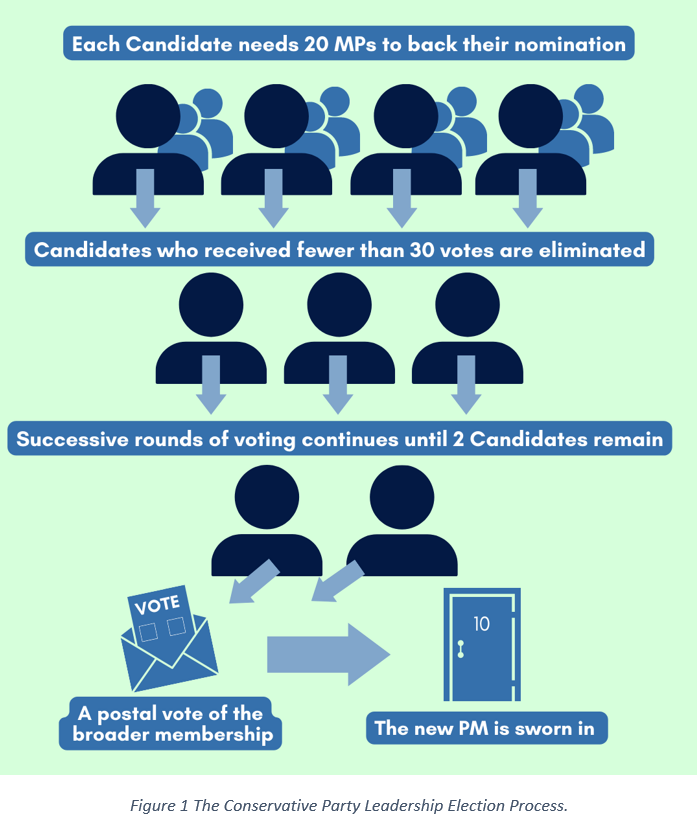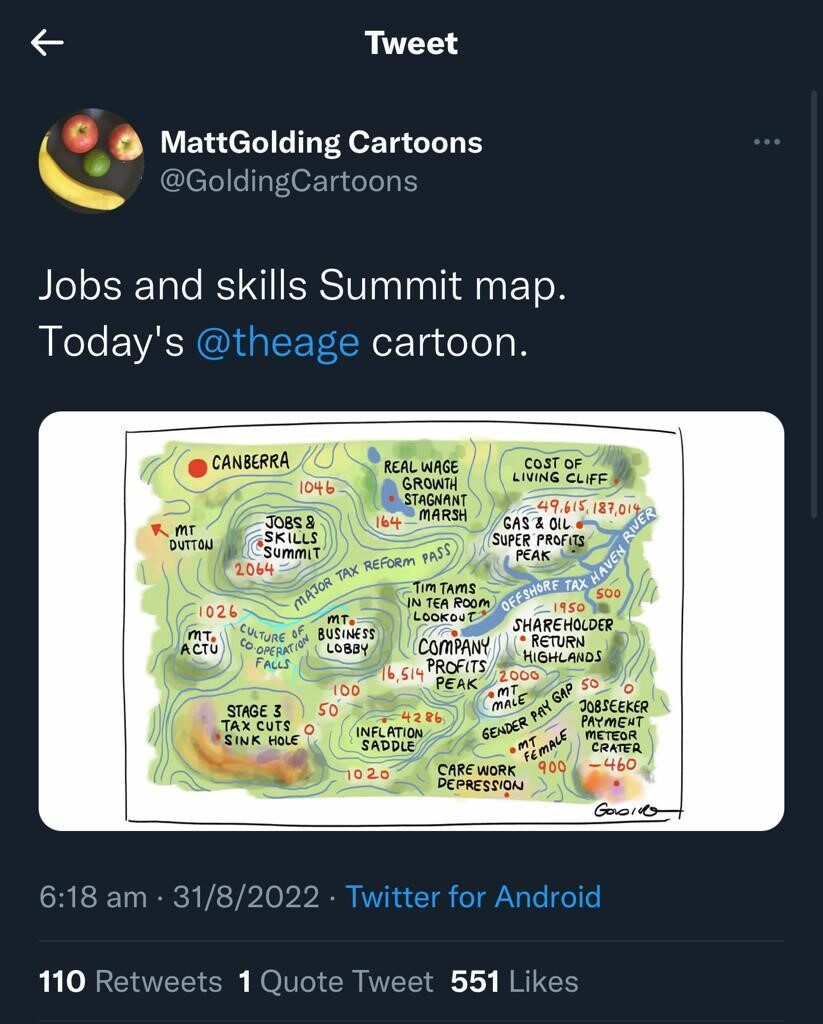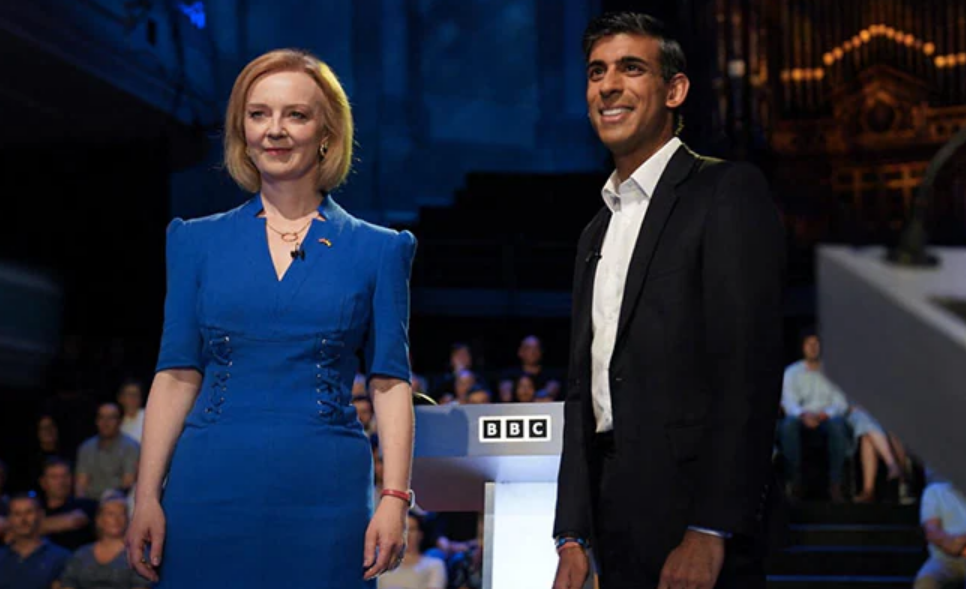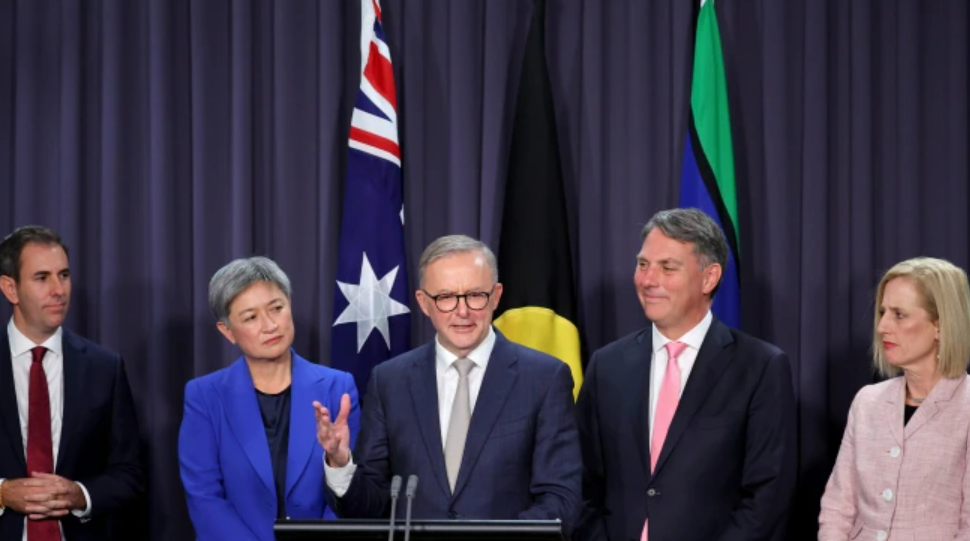THE BATTLE FOR BRITAIN: Truss and Sunak tussle for the top job
A new British Prime Minister will be elected this week. Who’s in the race? What do they stand for? What does this mean for Australia? How did this happen? The Nexus Team have answered all these questions, in this week’s article.
It has been over a month since Boris Johnson resigned as Prime Minister of the United Kingdom.
Standing outside Number 10 Downing Street, his blonde mop of hair flapping in the summer breeze, he bid his farewell, conceding that “no one is indispensable”. Johnson’s departure was spurred by the resignation of 60 of his colleagues, including the majority of his Cabinet. After months of scandal and internal bickering, the Johnson era was over.
For the Conservative Party, this triggered a two-month internal election process. A series of run-off elections are held and voted on by the MPs of the Conservative Party, with the final two candidates voted upon by the broader membership of the Conservative Party via a postal vote.

Who’s who?
You may wonder, “sure, I have heard of Liz Truss and Rishi Sunak. However, I don’t know their background and what they stand for.” Well, let us break it down for you.
Rishi Sunak, the self-proclaimed underdog
The 42-year-old Sunak was born in Southampton and is the eldest son of Yashvir and Usha Sunak. Yashvir was a general practitioner, and Usha was a pharmacist who ran the local chemist. Independently educated, Rishi graduated from Lincoln College, Oxford, with a first in Philosophy, Politics and Economics.
While at University, he interned with Conservative Party Head Quarters. After Graduation, Sunak joined the Investment Bank Goldman Sachs, as an analyst. He departed in 2004 to take up roles as a hedge fund manager and obtained an MBA from Stanford University in 2006. He married Akshata Murty, the daughter of Infosys founder and Indian Billionaire N. R. Narayana Murthy, in 2009. He later worked as a director in his father-in-law’s investment company until his successful election replacing long-term MP William Hauge as the Member for Richmond (Yorks) in 2015. A blue-ribbon Conservative, Whig, Royalist seat dating back to Kings Charles I ‘short parliament’ of 1640.
A strident Brexiteer, Sunak rose quickly through the ranks of the Conservative Party, taking the role of Parliamentary Under-Secretary of State for Local Government under the Leadership of Theresa May.
“This is a once-in-a-generation opportunity for our country to take back control of its destiny… I believe our nation will be freer, fairer and more prosperous outside the EU.” – Rishi Sunak on Brexit.
When Boris Johnson installed himself as Prime Minister after toppling Teresa May, Rishi was elevated to the Chief Secretary to the Treasury and finally to the role of Chancellor of the Exchequer in February of 2020.
Rishi became well known to the public throughout the United Kingdom for the measures introduced as Covid-19 began to grip in March 2020. Implementing the Coronavirus Job Retention Scheme, Government grants covered 80% of the salary of retained workers up to £2,500 a month – above the median income, deferring VAT payments, furloughing staff rather than terminating, deferred £30bn of taxes until June 2020, and cash grants of £25,000 for small businesses.
The Final straw for Sunak was the Chris Pincher scandal which rocked the Houses of Parliament in July. Pincher had previously resigned as Comptroller of the Household (Assistant Whip) and referred to the Conservative Party’s complaints procedure and the police. He was accused of sexual assault by former Olympic rower and Conservative candidate Alex Story in 2017.
The more recent scandal broke as then Prime Minister Johnson had entrusted Pincher with the role of Government Deputy Chief Whip. Allegations levelled at Pincher state he had sexually assaulted two men after a night out at the Carlton Club, a prestigious private members club in London. Johnson stood by him and then backflipped. Pincher resigned on June 30, 2022, after admitting he had “drunk far too much” and “embarrassed myself and other people.”
On July 2, it began.
First Sajid Javid, then Rishi Sunak resigned, then more and more. Within 33 hours, over 50 resignations had been signed, and Johnson’s Prime Ministership was on life support. Finally, the new Education secretary Michelle Donovan and new Chancellor Nadhim Zahawi organised a meeting with Boris Johnson and told him it was over.
Liz Truss, the unlikely Tory
The Oxford-born Truss grew up in a Labour household. Her Father, John Truss, was an emeritus professor of pure mathematics and her mother, Priscilla, was a nurse, teacher, and member of the Campaign for Nuclear Disarmament. During her schooling years, Elizabeth moved from Oxford to Scotland, then Leeds and even a year in Canada. Truss openly commented on the standard of government schooling during those years, saying the standards had “let down” children in the UK.
Regardless, Truss successfully applied for Oxford University, completing Philosophy, Politics and Economics at Merton College, Graduating in 1996. During her university days, she was an active member of the Liberal Democrats. Truss became President of the Oxford University Liberal Democrats and a National Executive committee member. In 1994 Truss addressed the Liberal Democrat Conference, where she called for the abolition of the Monarchy.
“…We believe in fairness and common sense. We believe in referenda on major constitutional issues; we do not believe that people should be born to rule…do you conference believe that?” – Liz Truss speaking at the Lib Dem conference 1994
A quote that Sunak has used time and again to remind conservative members of Liz Truss’s more progressive past.
After University, Truss worked for Shell and qualified as a Chartered Management Accountant (ACMA) in 1999. Liz unsuccessfully stood four times to sit in the House of Commons and Council. Namely, in 2001, Truss stood for the safe seat for the Labour Party of Hemsworth in West Yorkshire, then for Calder Valley in 2005. After losing her first two elections, Truss became the full-time deputy director of Reform, a conservative think tank, in January 2008. By 2009 Truss was selected by Southwest Norfolk under the leadership of David Cameron and was successful in the 2010 General Election.
With two years of Parliamentary service under her belt, Truss became Parliamentary Under-Secretary of State for Childcare and Education. She pushed to reform A-Levels, and Mathematics in schooling and led fact-finding missions to Asia to understand teaching methods in Shanghai. Her focus then looked to Childcare and proposed an overhaul of qualifications and funding. The proposals were welcomed by charity organisations but met with robust opposition by sections of the media and parenting groups.
In the lead-up to the 2015 General Election, David Cameron handed down a cabinet reshuffle. Truss was appointed Secretary of State for Environment, Food and Rural Affairs. In contrast with her portfolio predecessor, Truss firmly declared that Climate Change is real and “human beings have contributed to that”. She introduced a bee and pollinator policy to reverse falling bee numbers and regenerate natural meadows in the British Isles. Liz also cut taxpayer subsidies for Solar Panels erected on agricultural and pastoral land. She preferred those lands to be used for crops and campaigned to increase exports.
After the Brexit referendum defeat, Prime Minister David Cameron resigned and was replaced by Teresa May. In May’s first Ministry, Truss was rewarded with the roles of Secretary of State for Justice and Lord Chancellor. The first female to hold the Lord Chancellor role in the 1000-year history. Some castigated her in the House of Lords for not openly defending three Justices who came under fire in a ruling against the UK Government. Truss reversed the cuts the previous Lib Dem – Conservative Government made by injecting £1.3 billion investment programme into the prison service and recruiting 2,500 additional prison officers.
During her tenure as Secretary of State for International Trade Truss shaped the first Brexit trade outcomes. She introduced the Trade Act, lifted bans on arms deals with Saudi Arabia, and opened trade negotiations with Japan, New Zealand, Australia, Norway, Iceland, and Liechtenstein.
In one final cabinet reshuffle, Truss was once again promoted to Secretary of State for Foreign, Commonwealth and Development Affairs. She worked hard to meet Russian officials to seek peace in Europe and came under fire from former Australian Prime Minister Paul Keating, commenting, “Britain suffers delusions of grandeur and relevance deprivation.” Regarding Truss’s view on Chinese aggression in the Pacific.
“…work with all of our allies around the world, including Saudi Arabia, so that the UK is no longer dependent on Russia for oil and natural gas.” – Liz Truss on Ukraine and Russian Gas.
Unlike Rishi Sunak, Liz Truss did not tender her resignation in the wake of the Pincher scandal. Stating, “Loyalty to the Prime Minister stopped me from quitting.”
What are they standing for?
To woo the 160,000 members of the Conservative Party, Liz Truss and Rishi Sunak are taking different approaches to fiercely rising inflation, a protracted war in Ukraine, finalising new trade deals, Integrity in Politics, and a struggling NHS.
Liz Truss
- Says she will reverse the recent rise in National Insurance, which came into effect in April and hold an emergency budget
- Pledges to scrap a planned rise in corporation tax – set to increase from 19% to 25% in 2023
- Would suspend what is known as the “green levy” – part of your energy bill that pays for social and green projects.
- She says she will pay for the cuts by spreading the UK’s “Covid debt” over an extended period.
- Promises to change taxes to make it easier for people to stay at home to care for children or elderly relatives.
- Wants to create new “low-tax and low-regulation zones” across the country to create hubs for innovation and enterprise.
- She says she will not cut public spending unless there is a way to do so that will not lead to future problems.
- Would bring the target of spending 2.5% of GDP on defence forward to 2026 and introduce a new target of 3% by 2030.
Rishi Sunak
- Promises to reduce taxes “once we’ve gripped inflation” – saying it is a matter of when not if
- Pledges to cut the introductory rate of income tax by 1p in April 2024 and a further 3p by the end of the next Parliament
- Also pledges to scrap the 5% VAT rate on household energy for one year if the price cap on bills rises above £3,000 for the typical household.
- Says independent pay review bodies should decide on public sector pay deals.
- As chancellor raised National Insurance by 1.25p in the pound to pay for health and social care but also raised the earnings level at which it starts to be paid to £12,570
- Also announced a plan to increase corporation tax from 19% to 25% in April 2023
- Promises to maintain defence spending and says we should view the current minimum level of spending of 2% of GDP “as a floor, not a ceiling.”
Who makes up the Conservative Party?
Gender
- Female 37%
- Male 63%
Age of the party
- 65+ – 39%
- 50-64 – 19%
- 25-49 – 36%
- 18-24 – 6%
Region of the UK
- London – 14%
- Southern England – 42%
- Midlands and Wales – 18%
- North – 20%
- Scotland – 6%
EU Referendum 2016
- Leave 76%
- Remain 24%
Who is likely to win?
Polls published by YouGov in the middle of August suggest Liz Truss has a commanding lead in the polls. However, Rishi Sunak enjoyed the most substantial support from sitting conservative MPs in the first rounds of the leadership race.
Rishi has seen this as an opportunity to engage with an information campaign about Liz Truss’s past indiscretions with Brexit, her membership of the Liberal Democrats and her Affair with a former conservative MP in 2005.
Meanwhile, Rishi has also seen troubles in his backyard with his wife Akshata Murty profiting from her ‘non-dom’ (a person living in the United Kingdom who is considered under British law to be domiciled i.e., with their permanent home in another country) status and minimising her payable tax by millions of pounds. a troubling place to be when you are the former Treasurer of the nation.
There is a more straightforward path for Liz Truss; however, be watchful of a professional political operator in Rishi Sunak.
The new Leader of the Conservative Party will be announced on Monday, September 5, 2022, UK time.
In Case You Missed It & Tweet of the Week

Latest posts by Nexus APAC (see all)
- Examining Medicine Shortages in Australia - February 7, 2026
- The Secretaries of Federal Departments - January 31, 2026
- Merry Christmas from the Nexus APAC Team - December 19, 2025



